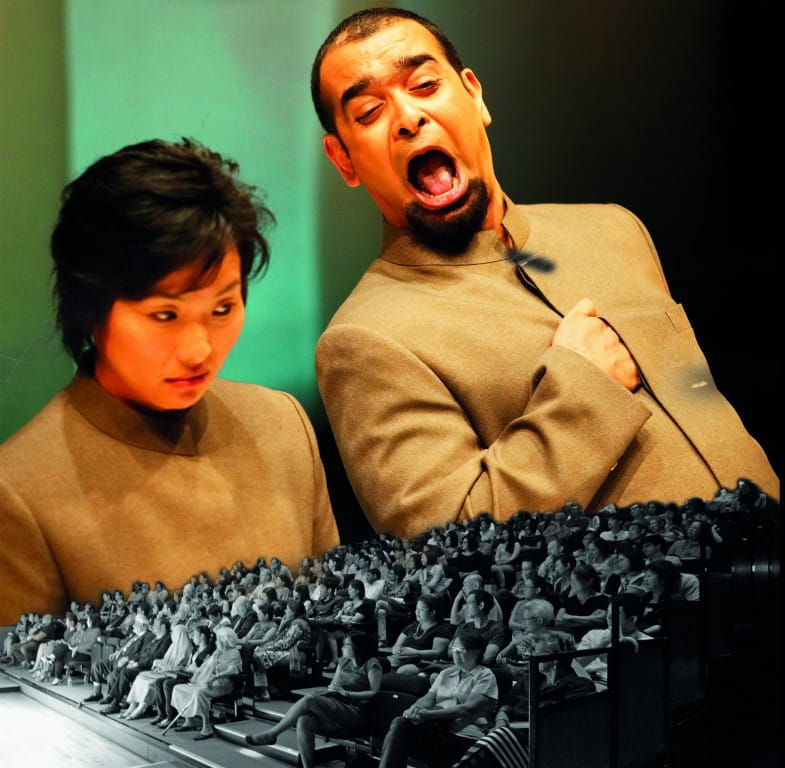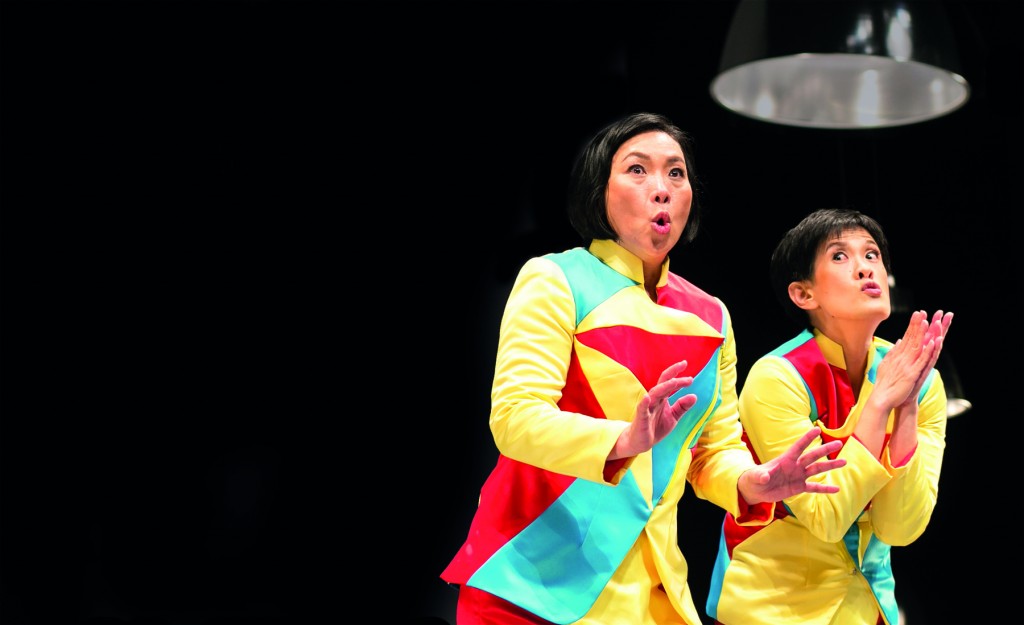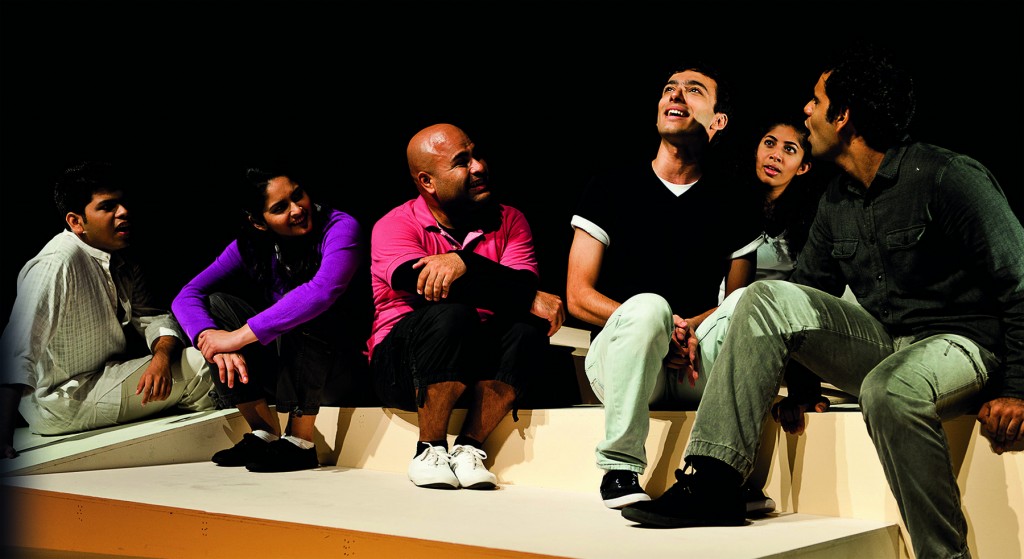
above: Huzir (right) and Claire acted together in Atomic Jaya in 2013. below: Audience attending the book launch of Huzir Sulaiman’s Collected Plays 1998-2012.
The story of Huzir Sulaiman and Claire Wong is about how the love of theatre brought them together in a marriage that birthed a new theatre company. As Joint Artistic Directors of Checkpoint Theatre, Huzir and Wong have used their artistic skills and life experiences to forge a theatre practice that cuts across cultures.
by Balvinder Sandhu
Huzir Sulaiman and Claire Wong met in 2001 when Wong acted in Huzir’s Atomic Jaya, which was staged in Singapore and directed by the late Malaysian director Krishen Jit. Huzir, formerly an actor, and currently a director and writer, was very impressed with Wong’s acting at their first meeting during a rehearsal in Kuala Lumpur. Wong, who is also a filmmaker and qualified lawyer, went out for dinner with Huzir to get better acquainted at Jit’s request.
Despite having spent a large portion of their lives in Singapore, theatre’s power couple Wong and Huzir still feel firmly attached to their birthplace, Malaysia. Now Singapore permanent residents, their love for both countries has influenced the birth of the pair’s love child — Checkpoint Theatre — symbolic of the checkpoint between two neighbouring states. The Malaysia-born couple set up their Singapore-based Checkpoint Theatre a year after and got married in 2004.
What characterises the work that you do?
Wong: I am concerned with both emotional authenticity and craft. I believe in being rigorous and honest in our work as well as in the subtleties, complexities and nuances in my characters and their stories.
Huzir: I may not be the best person to comment, but Kathy Rowland, the theatre scholar, wrote in her introduction to my Collected Plays 1998-2012:
“I am concerned with both emotional authenticity and craft. I believe in being rigorous and honest in our work as well as in the subtleties, complexities, and nuances in my characters and their stories.”
— Claire Wong
“Huzir’s abiding interest in what motivates people to do what they do is the scaffolding upon which each of his plays is built upon. His finely-tuned sense of observation has given us plays and characters that have never appeared on the Malaysian and Singapore stages before. They are unique in their composition. The audience’s engagement with the characters differs from play to play, as befits the narrative thrust of the works. Watching a Huzir Sulaiman play is never a passive experience. “
How has your relationship developed through your shared craft?
Wong: We are each other’s biggest supporter and harshest critic. Theatre-making is all consuming and very demanding, so we are always grateful to have each other to turn to for honest, intelligent and sensitive advice, and a warm hug of encouragement. We make each other laugh — which is very important.
Huzir: In the past, there was a contrast in our work styles. My wife tends to get quite caught up in work, while I was always more strict about having some time to relax. Over the years, Claire and I have reached a mutual understanding about work.

How do you handle conflict or differing opinions?
Huzir: We both are also blessed with the ability to see reason extremely quickly and decide on what’s best for the show. We thankfully take the best of both personal and professional dynamics: spark off each other’s ideas and build on each other. We care a great deal about each other and we also care a great deal about making very good work. So we talk things out in a very short period of time.
Wong: We actually hardly ever disagree creatively when we work together.
Since you are both formerly from Malaysia, what’s the reason for doing Singapore productions?
Huzir and Wong: Quite simply, Singapore is home. Huzir has been living here since 2001 while Claire has been here since 1982. Huzir’s mother was born in Singapore, and he has a lot of Singaporean relatives. Similarly, Claire’s father was born in Singapore, and likewise has many family ties here.
Huzir: Singapore is home. It’s where we have made our professional and personal lives together, and it’s the place that inspires, challenges and nurtures us as artists.
“People ask me, are you Malaysian or Singaporean? And I always say, one’s my mother and one’s my father, and that’s the honest truth. They both have an important part in my life, in the same way you have different relations with your parents, but they are both equally as important.”
— Claire Wong, quoted from The Straits Times Life!, 24 November 2014.
Are there any interesting insights you’ve learnt from your partner’s culture?
Wong: Growing up and working in Singapore and Malaysia, we are very aware of and familiar with each other’s
cultures. We enjoy each other’s festivals, food and clothes. I recall Huzir
being delighted when I made him steamed fish at home the way my Cantonese mother cooks it. The light and delicious style of cooking by steaming can be counted as a discovery for him!

Claire Wong in a play titled Occupation.
MAKING A POINT
Since its founding in 2002, Checkpoint Theatre has been creating important contemporary Asian plays that have received critical acclaim from local and international audiences. Its productions include political satire Atomic Jaya, family drama For Better Or For Worse and Occupation, about the Japanese Occupation. This year, the company was awarded the National Arts Council’s Major Grant, a three-year funding for arts organisations which contribute significantly to Singapore’s arts scene. Checkpoint is also a recipient of Singapore International Foundation’s Singapore Internationale, which partners Singapore artists to promote the awareness and understanding of Singapore through arts, culture and design. The festival was held in Sydney and Checkpoint Theatre was the only international theatre company invited to be part of the event which featured Australian plays. Staged readings, industry forums and masterclasses were part of the repertoire.
Checkpoint Theatre also publishes books. Its third publication, This Is My Family: New Singapore Plays Volume 2, recently launched in October, is a collection of six critically-acclaimed plays centred on family and its infinite permutations written by up-and- coming playwrights and established theatre-makers.
MENTORING TOMORROW’S THESPIANS
Checkpoint Theatre is also actively involved in mentoring a next generation of theatre-makers through its programmes.
Its mentorship programme is one of the main thrusts of Checkpoint Theatre. A recent mentorship workshop in Malaysia was held as part of the George Town Festival in Penang — it showcased the cross-cultural collaborative efforts between Singapore artists and Malaysian participants to promote better understanding between the two countries.
Checkpoint’s mentorship programme was first conceptualised by Huzir when he taught the first undergraduate playwriting course at the National University of Singapore (NUS) from 2007 to 2013.
During that time, Wong and Huzir served as principal tutors for NUS Stage, an English-language theatre company at the tertiary institution. The mentorship programme covered all aspects of theatre practice, including writing, acting, directing, design and management.
In 2013, the theatre company launched its Associate Artists Scheme, which recognises and builds on the existing relationship between emerging artists and the theatre company. One of the groups comprising Lucas Ho, Faith Ng, Joel Tan and Shiv Tandan showcased their works-in-progress in the form of dramatised readings in December 2013. Faith Ng now teaches the playwriting course in NUS English Department whereas actress Oon Shu An has become Associate Artist this year.
What is your perspective regarding mentoring creativity?
Huzir: Someone pointed out to me recently that one of our strengths as a company is the ability to bring out artists’ unique voices, and creating the conditions where these voices can flourish. It really boils down to listening well and to being observant; and putting aside your ego and artistic vision to respond to their progress sensitively. I’m proud that the artists we mentor have very different styles and themes. You want people to carve their own version of theatre that only they can do. Our job is to help them do it as well as they possibly can.
Wong: While I have my own strong views on how I work, whether as an actor or as a director, I hope that the people I mentor are able to learn or pick up things that inspire them from observing my processes.
When I work with younger people and mentor them, I feel it’s important to be aware of the techniques that can be taught. Take, for example, mentoring a young director. In the past, I’ve given practical tips on how to communicate and articulate clearly to your actors what you are expecting from them. So it’s a combination of giving practical tools and extending emotional support and encouragement.
“An individual’s creativity is unique to that person. You need to be a good listener and be supportive without getting in the way.”
— Claire Wong
What are your roles in mentorship?
Huzir: I am primarily involved in the development of new writing, but when I direct, I mentor one or more assistant directors.
Wong: I mentor emerging theatre-makers in production, directing, and writing. I’ve picked up from Huzir the art of giving feedback in stages, so that people can focus on one main point at a time without getting overwhelmed by the many different things on their minds.

Associate Artist Shiv Tandan (third from right) is one of the many Checkpoint Theatre artists mentored by Huzir and Wong, and he has successfully written and produced The Good, The Bad and The Sholay.
